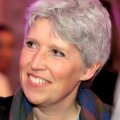
dr. JEM (Judith) Klostermann
Researcher policy processesI started my career as a biologist providing environmental policy advice at TNO. While working there I started to wonder if a sustainable society is achievable at all. To learn more about the human aspects I did a PhD which resulted in a dissertation on social construction of sustainability. Since 2003, I am working in Wageningen as a hybrid scientist, using knowledge from public administration and social science in the domains of climate change, water, nature and agriculture. Technically educated people often ask themselves why good ideas aren’t simply implemented in society. They see their solutions as politically neutral. People without a technical background sense the political content of the technical solutions but when they enter into a dialogue with natural scientists, they are deterred by the deeply technical discussions. What I try to do is build bridges between these two groups. I have just enough knowledge to more or less follow the natural science; and sufficient knowledge how people think and operate to create a connection and facilitate a dialogue.
Some examples of the kind of projects I do:
Involving users in the quality assurance project of the Copernicus Climate Data Store (CDS): The CDS aims to serve everyone in Europe and elsewhere with climate information. Large datasets are available as well as software tools to analyse the data for the user’s own specific purposes. The CDS is developed by climate scientists and software specialists, and is not usable yet for less specialized users. By involving different types of users we provide advice how the CDS can develop to expand its user base.
Communities of practice in municipalities to discuss the results of the URBANFLUXES project: In this project micro-meteorology approaches were applied to find out how much heat humans add to the urban heat island, for example, with badly insulated housing. In the end it was not possible to calculate the anthropogenic heat because there were too many uncertainties.
Negotiation of uncertainties in the South-Western Delta of the Netherlands: The Delta Works created hard barriers between seawater and freshwater. To help nature, more interaction between salty and freshwater is promoted, but in this discussion, many different views were revealed what ‘salty’ or ‘brackish’ or ‘fresh water’ actually means. These different views partly block progress towards a compromise between stakeholders.
https://research.wur.nl/en/publications/balancing-offshore-wind-energy-nature-conservation-and-food-produ